| Pages:
1
2
3
4 |
ManyInterests
National Hazard
   
Posts: 952
Registered: 19-5-2019
Member Is Offline
|
|
Duly noted. The CHP is dry now. I did have to scrap the glass bowl with a metal spoon since there was no way I could get it off otherwise. I don't
normally dry energetics this way, but given that CHP is basically formed in a Schweizer's reagent, I couldn't use coffee filters and gently remove
them off that like I do with NHN or ETN or any other energetic I normally make.
I with every minor scrape I transferred the chunks bit by bit to another container, and after that I took teeny tiny bits from that into another
container to grind up with a rubber spoon to get a powdery consistency. I took as much precaution I could take with this.
The final yield after recrystalization and burn tests is 5 grams from this. Not a lot, but I probably lost quite a bit due to recrystalization. It is
very blue and it burns MUCH faster. It doesn't vanish.
I am doing another CHP synth right now. This time using 2.54 g of CuO and 39.55 g of ammonia. The hexamine and AP proportions remain the same (1.5
grams and 11 grams respectively).
And this time it is STILL black even have vigorous shaking and stirring. I am heating it up with strong stirring now as well.
Edit: No, it's 30 C and it is getting very blue, this time a clear blue and not a murky blue like last time. I think it's gonna be alright.
[Edited on 20-9-2022 by ManyInterests]
|
|
|
Laboratory of Liptakov
International Hazard
    
Posts: 1419
Registered: 2-9-2014
Location: Tel Aviv University
Member Is Offline
Mood: old jew
|
|
Firstly is necessary prepare pure TACP. CHP is else and second step. Best method is Liptakov converter. Basic ratios are: 100% AP + 40% Cu wire a +
300% ammonia water. (22- 28%) Usually 30g AP + 12g Cu + 90 - 100 g ammonia water. Run temperature 10 - 15 C. Max 25 C at last 5 - 10 minute. Time of
reaction is usually 1 hour with use ball mill mixer. Or 3 - 24 hours for hand mixing. (24 hours for lazy man)
Final TACP is pure, without CuO impurities.
Notice:
For some unknown reason, everyone who makes TACP for the first time always uses the CuO method. And their batch is always contaminated. Black + white,
or blue + black and similarly. Only after losing a large amount of raw materials do they finally they use the Liptakov convertor method in
desperation, which provides pure TACP always. Basic rule: Than more concentration of NH4OH = better results. Usually 25% is enough. At use NH4OH 6%
will the crystals TACP contain a big amount of NH4ClO4. High concentration NH4OH displaces NH4ClO4 (as impurity) from crystalls of TACP.
Development of primarily - secondary substances: CHP (2015) neutral CHP and Lithex (2022) Brightelite (2023) Nitrocelite and KC primer (2024) Diper
60 (2025)
|
|
|
ManyInterests
National Hazard
   
Posts: 952
Registered: 19-5-2019
Member Is Offline
|
|
OK I will do this. Since the stuff I am making now will always need a recrystalization. I made too many mistakes and I am wasting too much ammonia on
this. Like my 2nd synth was better, but still too much CuO contamination. I'll make some TACP.
I have one question: Will wire from a 10 ga wire suffice? I have some very thick wires I won't need any more and I can salvage the pure copper from
there. There is no tinning or anything on the wire.
|
|
|
Laboratory of Liptakov
International Hazard
    
Posts: 1419
Registered: 2-9-2014
Location: Tel Aviv University
Member Is Offline
Mood: old jew
|
|
Best is the wire 1 - 2 mm of diameter. 10g of wire is enough for 25g AP. But for attempt can be used only 5g AP + 10g Cu + 15 ammonia water.
Ammount of wire is not exact condition. Condition is 5g AP on 15g NH4OH 25% (for example). Cu wire must be in excess always for easy pull from bath as
one wire. Good yield is 5g TACP from 5g AP as dry crystalls. Best yield is 5,5g TACP from 5g AP. Thus 110% TACP from 100% AP. With thick wire will
reaction slow.
With very fine wire (hair wires) arises unwanted copper oxides/hydroxides are formed. Light blue copper oxides and copper hydroxides are insoluble in
water. Like a very fine powder.
Development of primarily - secondary substances: CHP (2015) neutral CHP and Lithex (2022) Brightelite (2023) Nitrocelite and KC primer (2024) Diper
60 (2025)
|
|
|
ManyInterests
National Hazard
   
Posts: 952
Registered: 19-5-2019
Member Is Offline
|
|
OK, the individual wire diameter is thing, the 10ga just has a lot of wire.
| Quote: | | 5g AP + 10g Cu + 15 ammonia water. |
I'll double this because I want one yield. i assume you mean 15 grams of ammonia water.
and after I make the TACP, how much TACP to how much hexamine and ammonia water do I use for CHP? Or after filtering the unreacted copper, do I just
add hexamine and it will become CHP?
Edit: how is it looking? This is after 35 minutes of continuous hand swirling.
[Edited on 20-9-2022 by ManyInterests]
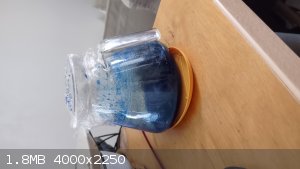
|
|
|
Laboratory of Liptakov
International Hazard
    
Posts: 1419
Registered: 2-9-2014
Location: Tel Aviv University
Member Is Offline
Mood: old jew
|
|
Better will do it CHP as " Dry way". Thus mixing 4,3g TACP + 0,3g HMTA + 0,3g NH4ClO4. As dry powders. + 0,3g ammonia water. Create fine porridge.
Increase temperature on plate on 40 C and create from porridge dry agglomerates 2x2mm. Using sieve eyes 2x2 mm. This method provides the least loss of
all reagents. Compared to crystallization from solution.
Development of primarily - secondary substances: CHP (2015) neutral CHP and Lithex (2022) Brightelite (2023) Nitrocelite and KC primer (2024) Diper
60 (2025)
|
|
|
Laboratory of Liptakov
International Hazard
    
Posts: 1419
Registered: 2-9-2014
Location: Tel Aviv University
Member Is Offline
Mood: old jew
|
|
A photograph of the slightly wet and aspirated (Buchner) TACP will be required for assessment. It should be a monochromatic beautiful blue color.
Medium blue.
Development of primarily - secondary substances: CHP (2015) neutral CHP and Lithex (2022) Brightelite (2023) Nitrocelite and KC primer (2024) Diper
60 (2025)
|
|
|
MineMan
International Hazard
    
Posts: 1015
Registered: 29-3-2015
Member Is Offline
Mood: No Mood
|
|
Can chicken be marinated in this TACP ammonia mix? Also, any update on producing TACO?
|
|
|
ManyInterests
National Hazard
   
Posts: 952
Registered: 19-5-2019
Member Is Offline
|
|
I need to buy a new screen for the my CHP and TACP filtration, since it is getting clogged and I think it is giving way. Would one with a 0.125mm mesh
work? What about 0.075mm? Or is that simply too fine?
I posted the pictures of A: My 2nd CHP synth, which uses more ammonia and less CuO but I still saw some CuO contamination. but is it worth
recrystalizing or is it good enough for blasting caps?
The others are of the TACP. I didn't wash the jar since I think the stuff at the bottom might be TACP. Most of the liquid has dried up since I kept it
out for several days now.
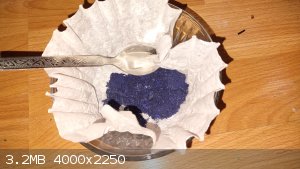 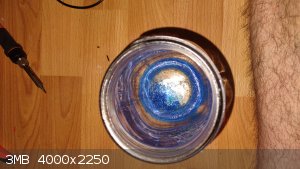
[Edited on 23-9-2022 by ManyInterests]
|
|
|
ManyInterests
National Hazard
   
Posts: 952
Registered: 19-5-2019
Member Is Offline
|
|
Since SM wouldn't let me post the other pics, here is my mesh and the TACP I collected (it isn't a lot. Only around 3.8 grams from 11 grams of AP)
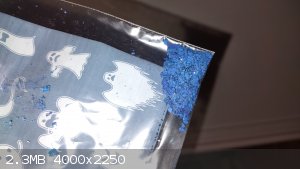 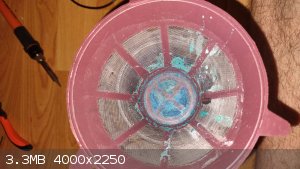
|
|
|
Laboratory of Liptakov
International Hazard
    
Posts: 1419
Registered: 2-9-2014
Location: Tel Aviv University
Member Is Offline
Mood: old jew
|
|
This is what a clean and dry TACP should look like. It also contains a darker grain, but that's not a bad thing. Is old 1 year.
I recommend mixing all 4 samples and recrystallizing. For 1g of dirty (dry) TACP, use 2.5g of NH4OH 25%. And heat in a closed jar to 60 C. Then (still
closed) cool to - 18 C in the refrigerator. For 4 hours. And filter again at approx. 0 C.
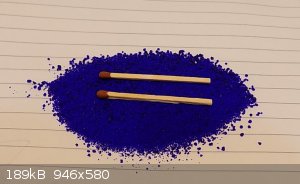
Development of primarily - secondary substances: CHP (2015) neutral CHP and Lithex (2022) Brightelite (2023) Nitrocelite and KC primer (2024) Diper
60 (2025)
|
|
|
ManyInterests
National Hazard
   
Posts: 952
Registered: 19-5-2019
Member Is Offline
|
|
I think my CuO might not be up to task for this. My third and largest synth (with even more reduced CuO and more ammonia added) is just not reacting
sufficiently. I think there is carbon contamination in the CuO done specifically to prevent energetics from being made with this... I should have
filtered the stuff out, but it'll be a while. I wanna move onto other projects.
|
|
|
freeflyfreak
Harmless

Posts: 10
Registered: 26-10-2015
Member Is Offline
Mood: calm and collected
|
|
Higher CHP yields with less ammonia and solvent
I thought I'd post this for comments/concerns.
Starting with copper perchlorate, ~25% NH4OH and lab grade Hexamine and NH4ClO4. The result is a zero waste process with minimal solvent that
produces very dark purple crystals that have remained darker purple and for longer than other ratio's I've observed/tried.
1 g CuClO4
.1g NH4ClO4
.1g Hexamine
1ml 25% NH4OH Sol.
Mixed into sludge in Petri dish and placed on a 50C hotplate. Dried in a few minutes. Placed into 4 separate containers in dry cold, dry hot, humid
cold and humid hot environments for 1 week with no observed changes to color or texture.
I figured the "no waste" approach might be interesting to others. Acknowledging there is a similar path starting with TACP to synth CHP66, you can
also syth pure TACP from CuClO4 and NH4OH without any waste of crystallization by using minimal NH4OH to dissolve the CUClO4 and then evaporate at
50C. Given the lack of need for lots of solvent, It's much less wasteful of precious ammonia for those who have to make that at home too.
Have a great day!
|
|
|
Laboratory of Liptakov
International Hazard
    
Posts: 1419
Registered: 2-9-2014
Location: Tel Aviv University
Member Is Offline
Mood: old jew
|
|
If you have Cu ClO4 and hexamine, then you don't need to bother making CHP. You can make LL8. (Cu8) And you save all the NH4ClO4. And all the ammonium
hydroxide. And you shorten production to just a few minutes. And as a bonus, you get a more explosive substance than CHP.
Reagents for preparation:
Cu(ClO4)2 (hexahydrate)........2.4g
Hexamine ..............................0.6g
Distilled H2O............................0.5g
http://www.sciencemadness.org/talk/viewthread.php?tid=158259
Have a great day! ............................ (EtOH is not need also)
[Edited on 14-11-2022 by Laboratory of Liptakov]
Development of primarily - secondary substances: CHP (2015) neutral CHP and Lithex (2022) Brightelite (2023) Nitrocelite and KC primer (2024) Diper
60 (2025)
|
|
|
specialactivitieSK
Hazard to Self
 
Posts: 94
Registered: 21-10-2014
Member Is Offline
Mood: No Mood
|
|
Is it ok by Berta no.8 (6/8mm) full pressing on the end CHP segment 500 mg with 1000 kg press?
[Edited on 6-4-2023 by specialactivitieSK]
|
|
|
Laboratory of Liptakov
International Hazard
    
Posts: 1419
Registered: 2-9-2014
Location: Tel Aviv University
Member Is Offline
Mood: old jew
|
|
Not. At cavity 6/8 mm is for output segment press 50 - 100 Kg enoug.
Development of primarily - secondary substances: CHP (2015) neutral CHP and Lithex (2022) Brightelite (2023) Nitrocelite and KC primer (2024) Diper
60 (2025)
|
|
|
ManyInterests
National Hazard
   
Posts: 952
Registered: 19-5-2019
Member Is Offline
|
|
I decided to bump this thread up because I am making CHP again. This time with some modifications.
I am using the usual proportions, but A: An excess of ammonia (you recommended that 30-40g of 25% ammonia is needed. I used 52g of 27%) and 1 extra
gram of ammonium perchlorate.
I first added the CuO to the ammonia solution first, then heated it to 45-50C, then I filtered the unreacted/undissolved excess, after that I added
the rest of the reagents and I am heating it again. I am currently reacting it in a hot water bath (50C) on my mantle.
After about ten more minutes, I will let it cool down slowly on the mantle in the bath overnight and then put it in the fridge (not the freezer) for
another 8 or 10 hours.
I bought a batch of nylon filters specifically to use to filter out the CHP, they're quite fine and should retain all CHP while keeping the liquid
away.
I hope to make high quality CHP this time. I am gonna make lots of perchlorates this summer and I will try to do LL8 and other cool stuff you've made
recently. Those look like fine quality detonating material! 
Edit: So far it is looking VERY blue. Much bluer than I've seen before, I think this batch is going to be the one!
Edit2: OK, I got this solution! Blue as it can be! I decided to put in the freezer and not the fridge, I think it'll be OK. I hope I get some good
crystalization in the morning.
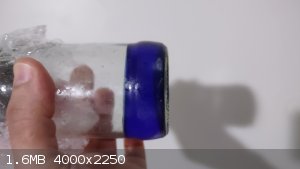
[Edited on 1-7-2023 by ManyInterests]
|
|
|
Laboratory of Liptakov
International Hazard
    
Posts: 1419
Registered: 2-9-2014
Location: Tel Aviv University
Member Is Offline
Mood: old jew
|
|
Color looks a like quality TACP / CHP......
Development of primarily - secondary substances: CHP (2015) neutral CHP and Lithex (2022) Brightelite (2023) Nitrocelite and KC primer (2024) Diper
60 (2025)
|
|
|
ManyInterests
National Hazard
   
Posts: 952
Registered: 19-5-2019
Member Is Offline
|
|
I see lots of very beauitful crystals forming at the bottom of this! 
After drying this and testing, I will make another batch then I will make Zielenex.
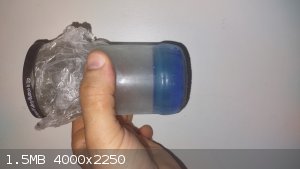
|
|
|
ManyInterests
National Hazard
   
Posts: 952
Registered: 19-5-2019
Member Is Offline
|
|
And here is the mostly dry result! I dried it over a hot water bath on my stove. Not on the stove directly like you did, but using two glass
containers.
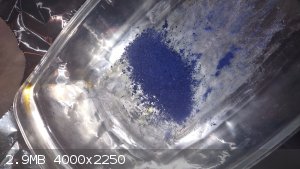 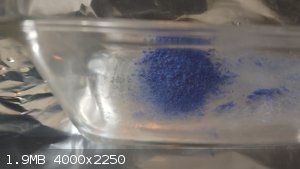
|
|
|
Laboratory of Liptakov
International Hazard
    
Posts: 1419
Registered: 2-9-2014
Location: Tel Aviv University
Member Is Offline
Mood: old jew
|
|
Your dry CHP is too much white color. It seems on too much NH4ClO4 in substance. Decisive will of course test in alu foil by video CHP66.
Development of primarily - secondary substances: CHP (2015) neutral CHP and Lithex (2022) Brightelite (2023) Nitrocelite and KC primer (2024) Diper
60 (2025)
|
|
|
ManyInterests
National Hazard
   
Posts: 952
Registered: 19-5-2019
Member Is Offline
|
|
It is not good CHP, it turned greened.
I used 1 additional gram of AP in this compared to other ingridents. As I said, I will tell you all the things I did and in what order.
1: Measured out 53g of 27% ammonia solution and put 2.7g of CuO in it (used a sauce jar with a sealed metal lid)
2: heated it to 45/50C for 20 minutes then let it cool. Mixed it periodically. Heated in water bath.
3: filtered out excess CuO, as this was a MAJOR problem me for in the past
4: Added in the rest of the ingredients and heated in hot water bath again.
the rest is just cooling and filtering (I used a nylon filter).
I spoke with some other users and I think my ammonium perchlorate is not pure enough for the task. The CuO was bought from a reputable source, the
ammonia used was very strong and pure (and I used both from chemical suppliers and home made), and the hexamine is very also very pure. The AP must be
the problem.
I've always had problems with the CuO not being used up and contaminating the product and turning it black in the end. That's why I filtered it out.
So as another note, the total reagents used are
11g of ammonium perchlorate
53g of ammonia solution
2.7g CuO (did not weigh what was filtered out)
1.5g of hexamine.
What else could have gone wrong?
|
|
|
Laboratory of Liptakov
International Hazard
    
Posts: 1419
Registered: 2-9-2014
Location: Tel Aviv University
Member Is Offline
Mood: old jew
|
|
If you don't have pure NH4ClO4 it is important firstly create a pure blue TACP according to the video:
https://www.youtube.com/watch?v=cfOZfhwKHjg&t=137s
And only then you create CHP according to CHP66 video.
https://www.youtube.com/watch?v=F94UpYRczkc
The method using CuO is an accelerated (simplified) method for CHP production. And it only works with pure chemicals.
[Edited on 5-7-2023 by Laboratory of Liptakov]
Development of primarily - secondary substances: CHP (2015) neutral CHP and Lithex (2022) Brightelite (2023) Nitrocelite and KC primer (2024) Diper
60 (2025)
|
|
|
ManyInterests
National Hazard
   
Posts: 952
Registered: 19-5-2019
Member Is Offline
|
|
I did the TACP method before with similarly poor results. I am convinced that I need to purify my ammonium perchlorate.
|
|
|
Laboratory of Liptakov
International Hazard
    
Posts: 1419
Registered: 2-9-2014
Location: Tel Aviv University
Member Is Offline
Mood: old jew
|
|
If you have NaClO4 and NH4NO3 you can try preparation TACP of this method:
https://www.youtube.com/watch?v=kUec6kHHxeM
Development of primarily - secondary substances: CHP (2015) neutral CHP and Lithex (2022) Brightelite (2023) Nitrocelite and KC primer (2024) Diper
60 (2025)
|
|
|
| Pages:
1
2
3
4 |